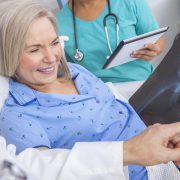
While they may appear solid, human bones are actually porous tissue. Healthy bones resemble a honeycomb inside, filled with holes and open spaces. The tissue that comprises bone is constantly absorbed and replaced, creating ever-changing patterns. As we age, bone tissue is not always replaced as quickly as it gets lost. This creates larger holes inside the bone, leaving them weak and susceptible to fracture.
This condition, called osteoporosis, affects more than half of people over age 50. Although many people do not realize they have the disease—or only discover they do after an injury—a bone scan can diagnose it before you experience a painful break.
The orthopedists at EmergeOrtho—Triangle Region often recommend bone scans, also called Dual Energy X-ray Absorptiometry (DEXA) scans, for patients at risk for osteoporosis or who have fractured a bone. The test results can help guide a treatment plan and help patients avoid future injury.
What is a Bone Scan?
Bone scans evaluate bone health by measuring bone density. The test can also reveal your risk for osteoporosis. It is a fast, non-invasive test that measures the mineral content in certain bones, such as your wrist, hip, or spine. The process is similar to an X-ray but uses less radiation.

During a DEXA bone scan, the technician begins by having you lie on a special DEXA scan table. They may provide special foam blocks to help you stay in the correct position and remain still for the entire scan.
Once you get in position, the DEXA machine’s X-ray arm passes over your body. The machine uses two X-ray beams to reduce overall radiation and ensure clear contrast between the bones and other tissue. After the scan, the bone density readings are converted into 3D color images and graphs for your doctor to interpret.
Understanding Bone Scan Readings
The images collected by the DEXA machine provide two scores: A T-score and a Z-score. The T-score compares your bone density to that of a healthy younger person, while the Z-score compares it to someone of the same age, gender, and race.
With both scores, lower numbers can mean more bone loss. A negative number means the bones are thinner however, negative numbers can actually be normal. Normal bone density is a T-score of -1.0 or higher or a Z-score of -2.0 or higher, and anything less than -2.5 indicates osteoporosis.
When Do Orthopedists Order Bone Scans?
Many healthcare providers recommend bone scans for patients who are over the age of 50. Bone loss begins to occur by age 30, especially among women, and DEXA screening can help identify the early stages of osteoporosis so it can get treated.
Orthopedists typically recommend bone scans for patients who have fractured a bone, especially when they have other risk factors for osteoporosis. In addition to age, other factors that increase the risk of lost bone mass include:
- Family history of osteoporosis or bone fractures.
- Additional diseases, including rheumatoid arthritis, diabetes, lupus, and liver and kidney diseases, can increase the risk of losing bone mass.
- Taking certain medications, including prednisone, some cancer drugs, and medication given after an organ transplant.
- A vitamin D deficiency (vitamin D is critical to bone strength.)
- Early menopause (before age 50) and low estrogen levels.
- Being underweight or having a small frame.
- Smoking, and using excessive amounts of alcohol.
Based on your medical history and current condition, your orthopedic surgeon may order a bone scan before proceeding with additional treatment.
Bone scans can also monitor the effectiveness of treatments for low bone density and changes in your bones over time.
Body Composition Testing with DEXA Scans
DEXA scans can also evaluate body composition, or how much muscle and fat you have and where. Many athletes use the results of these scans to guide their training plans to reach peak performance. Patients who have undergone weight loss surgery, or who are in a weight loss program, also have DEXA scans to evaluate their progress and guide adjustments to their diet or exercise programs for optimal health.
Bone Health at EmergeOrtho–Triangle Region
The highly regarded team of board-certified/board-eligible, fellowship-trained orthopedic surgeons at EmergeOrtho is dedicated to providing the highest level of care to every patient. As part of the commitment to patient-centered care, they use the most technologically advanced methods and equipment to ensure the most accurate diagnosis and effective treatments.
If you want to learn more about bone scans and discuss your risk for osteoporosis or any other bone health concern, we encourage you to request an appointment. Or, call us any time at (919) 220-5255.







